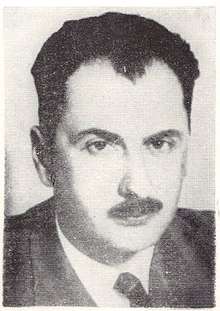Gheorghe I. Brătianu

Gheorghe (George) I. Brătianu (February 3, 1898 – April 23–27, 1953) was a Romanian politician and historian. A member of the Brătianu family and initially affiliated with the National Liberal Party, he broke away from the movement to create and lead the National Liberal Party-Brătianu.
Born in Ruginoasa, Baia County (nowadays in Iaşi County) to Ion I.C. Brătianu and Maria Moruzi (widow of Alexandru Al. Ioan Cuza), he studied at the National High School of Iaşi. In 1916, he joined the Romanian Army as a volunteer, in order to fight in the World War I Romanian Campaign. He fought on the Moldavian front in the summer of 1917, being wounded at Cireşoaia.
In 1917, Brătianu began studying Law at the University of Iaşi, from which he graduated in 1920. After obtaining a Ph.D. degree from the University of Cernăuţi in 1923, he started teaching history at the University of Iaşi. He married in 1925 Helene Sturdza (1901–1971) and they had three children. He later pursued his history studies at the University of Paris, from where he obtained a second Ph.D. degree in 1929, under the direction of Ferdinand Lot. In 1940, he became a history professor at the University of Bucharest. In 1942, he was elected to the Romanian Academy.
In 1947, he was placed under house arrest by the communist authorities. In May 1950, he was arrested by the Securitate, and sent to Sighet prison without trial. He died there three years later under unknown circumstances.
Books
- Recherches sur le Commerce Génois dans le Mer Noire au XIIIe Siècle, Paris, Paul Geuthner, 1929.
- Privilèges et franchises municipales dans l'Empire Byzantin, Paris, P. Geuthner; Bucharest, "Cultura naţională", 1936.
- Les Vénitiens dans la mer Noire au 14e siècle: la politique du sénat en 1332-33 et la notion de la latinité, Bucharest: Impr. Nat., 1939.
See also
External links
- "Ion I.C. Brătianu şi Gheorghe I. Brătianu - Aspecte ale relaţiilor dintre tată şi fiu", by Aurel Pentelescu, Revista Argeş, year IV (38), nr. 1 (271), January 2005
- "Evocarea figurii academicianului Gheorghe I. Brătianu, la 100 de ani de la naştere", Nicolae Ionescu, speech at the Chamber of Deputies of Romania, February 3, 1998